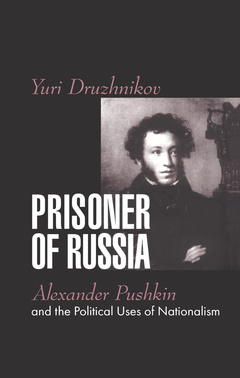Prisoner of Russia Alexander Pushkin and the Political Uses of Nationalism
Auteur : Druzhnikov Yuri

As the central figure in Russian literature, Alexander Pushkin (1799û1837) has been claimed by nearly every political faction, right and left, in Russian cultural politics over the past two centuries, culminating in his official canonization under the Soviet regime. In Prisoner of Russia, Yuri Druzhnikov analyzes the distortions and misrepresentations of Pushkin's cultural appropriation by focusing on Pushkin's attempts at emigration and his attitudes toward Russia and Western Europe.Druzhnikov's semi-biographical narrative concentrates on Pushkin's attempts to leave Russia after his graduation from the Lyceum, through his period of exile, until his early death in a duel in 1837. The matter of emigration from Russia was a politically charged issue well before 1917; witness the hostile reception of all of Turgenev's novels from Fathers and Sons on. The emigrÚ artist's cultural context is often used to assess his authenticity and stature as seen in the Western examples of Henry James, T.S. Eliot, or James Joyce. Druzhnikov sharply criticizes the omnipresent and reductive tendency in Russia (and the West) to define Russian cultural figures in terms of absolute essences and ideologies and to ignore the ambivalences that in fact help to define a writer's singularity. In the larger view, he argues, it is these that explain the variety and complexity of Russian culture.Druzhnikov's multidisciplinary approach combines literary and political history, with critical commentary arranged in chronological sequence. His interpretive apparatus ranges widely through nineteenth- and twentieth-century history, and provides the necessary intellectual context for nonspecialist readers. He also avoids the massive accumulation of trivial detail characteristic of so much Pushkinology. This accessible, valuable exercise in cultural history will be of interest to Slavic scholars and students, cultural historians, and general readers interested in Russian literature and culture.
Date de parution : 04-1999
15.2x22.9 cm
Date de parution : 04-2018
15.2x22.9 cm
Thèmes de Prisoner of Russia :
Mots-clés :
Young Man; Alexander Pushkin; Peter III; Ilya Druzhnikov; Vasily Zhukovsky; Thomas Moore; Boris Godunov; Llya Druzhnikov; Secretary Of State; official canonization; Common Language; Soviet regime; Nikolay Gogol; Kishinev prisoner; Ivan Turgenev; Pushkin's works; Eugene Onegin; Russian cultural politics; Pushkin’s Time; Tsarskoye Selo; Count Vorontsov; Count Nesselrode; Brother Sergey; Dorpat University; Mikhail Pogodin; Pskov Province; General Yermolov; Decembrist Uprising; Pushkin’s Poem; Face To Face; Gypsy Band; Ivan Ivanovich; Baltic Project; Pure Atheism



